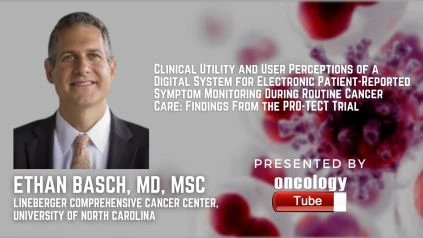Ethan Basch, MD, MSc from Lineberger Comprehensive Cancer Center, University of North Carolina speaks about Clinical Utility and User Perceptions of a Digital System for Electronic Patient-Reported Symptom Monitoring During Routine Cancer Care: Findings From the PRO-TECT Trial.
Â
Link to Abstract:
https://ascopubs.org/doi/10.1200/CCI.20.00081
Â
Â
ABSTRACT
Â
PURPOSE
Â
During ordinary oncology practice, there is growing interest in using digital tools for remote monitoring of patients’ symptoms. The therapeutic value and user impressions of these devices are both unknown.
Â
METHODS
Â
PRO-TECT is a multicenter experiment assessing the use of electronic patient-reported outcomes (ePROs) in persons with advanced and metastatic malignancies who are treated at community oncology practices in the United States (ClinicalTrials.gov identifier: NCT03249090). Weekly web or automated telephone surveys based on the Patient-Reported Outcomes version of the Common Terminology Criteria for Adverse Events (PRO-CTCAE) are administered, including warnings to nurses for severe or worsening symptoms. Patients and physicians who took part in the study were given surveys to fill out in order to get their input.
Â
RESULTS
Â
The majority of 496 patients across 26 practices deemed the system and questions to be simple to comprehend (95 percent), simple to use (93 percent), and relevant to their care (93 percent) (91 percent ). The majority of patients said PRO information was used by their physicians for care (70%), that it improved talks with clinicians (73%), that it made them feel more in control of their own care (77%), and that they would suggest the system to other patients (89 percent ). In both univariate and multivariable analyses, the scores for most patient feedback questions were significantly positively connected with weekly PRO completion rates. PRO information was helpful for clinical recording (79 percent), boosted the efficiency of patient talks (84 percent), and was effective for patient care, according to the majority of the 57 nurses (75 percent ). The majority of oncologists (91%) found PRO material valuable, with 65 percent utilizing PROs to influence patient talks and 65 percent using PROs to make treatment decisions on a regular basis.
Â
CONCLUSION
Â
The clinical relevance and value of implementing digital methods for monitoring PROs, particularly the PRO-CTCAE, in routine cancer care are supported by these findings.

